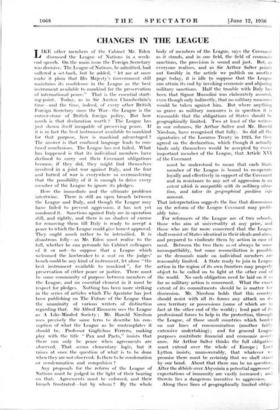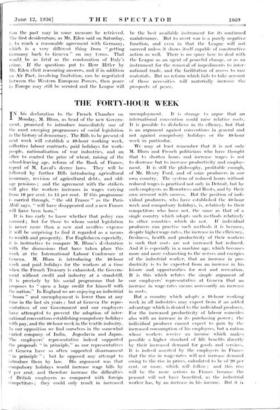CHANGES IN THE LEAGUE L IKE other members of the Cabinet
Mr. Eden discussed the League of Nations in a week- end speech. On the main issue the Foreign Secretary was decisive. The League of Nations, he admitted, had suffered a set-back, but he added, " let me at once make it plain that His Majesty's Government still maintains its confidence in the League as the best instrument available to mankind for the preservation of international peace." That is the essential start- ing-point. Today, as in Sir Austen Chamberlain's time—and the time, indeed, of every Other BritiSh Foreign Secretary since the War—the League is the corner-stone of British foreign policy. But how much is that declaration worth ? The League has just shown itself incapable of preserving peace. If it is in fact the best instrument available to mankind for that purpose, how is mankind advantaged ? The answer is that confused language leads to con- fused conclusions. The League has not failed. What has happened is that its individual members have declined to carry out their Covenant obligations because, if they did, they might find themselves involved in a joint war against Italy, and the fear and hatred Of war is everywhere so overmastering that the possibility of it is enough to drive every member of the League to ignore its pledges.
Here the immediate and the ultimate problems intertwine. There is still an open breach between the League and Italy, and though the League may have failed to prevent- aggression, it has not yet condoned it. Sanctions against Italy are in operation still, and rightly, and there is no shadow of excuse for removing them till Italy is ready to accept a peace to which the League could give honest approval. They ought much rather to be intensified. It is disastrous folly—as Mr. Eden must realise to the full, whether he can persuade his Cabinet colleagues of it Or not—to suppose that a League which welcomed the lawbreaker to a seat on the judges' bench could be any kind of instrument, let alone "the best instrument available to mankind ", for the preservation of either peace or juStice. There must be some community of purpose between members of the League, and an essential element in it must be respect for pledges. Nothing has been more striking in the series of articles which The Spectator has just been publishing on The Future of the League than the unanimity of various writers of 'distinction regarding that. Sir Alfred Zimmern sees the League. as A Like-Minded Society ; Mr. Harold Nicolson uses precisely the same term to describe his con- ception of what the League as he contemplates it should be. Professor Guglielmo Ferrero, making play with the title " Pax and Pacts," insists that there can only be peace when agreements are observed. That seems elementary . togic, but it raises at once the question of what- is to be done when they are not observed. Is there to be condonation or condemnation and compulSion?.
Any proposals for the reform of the League . of Nations must be judged in the light 'of their bearing on that. Agreements must be enforced, and their breach frustiated—but by whom 1- By the. whole body of members of the League, says the Covenant as it stands, and in one field, the field of economic sanctions, the provision is sound and just. But, as everyone realises, and as Sir Arthur Salter points out forcibly in the article we publish on another page today, it is idle to suppose that the League can attain its end by invoking economic and abjuring military sanctions. Half the trouble with Italy has been that Signor Mussolini was elaborately assured, even though only indirectly, that no military measures would' be taken against him. But where anything so grave as military measures is in question it is reasonable that the obligations of States shciuld be geographically limited. Two at least of the writers in our columns, Sir Arthur Salter and Mr. Harold Nicolson, have recognised that fully.. So did all the signatories of the Locarno Treaty in 1925, for they agreed on the declaration, which though it actually binds only themselves would be accepted by every important member of the League, that Article XVI of the Covenant must be understood to mean that each State member of the League is bound to co-operate loyally and effectively in support of the Covenant and in resistance to any act of aggression to on extent which is compatible with its military situa- tion, and takes its geographical position info account.
That interpretation suggests the line that discussions on the reform of the League Covenant may profit- ably take.
For reformers of the League are of two schools, those who aim at universality at any price, and those who are far more concerned that the League shall consist of States identical in their ideals and aims., and prepared to vindicate them by action in case of need. Between the two there mast always be some incompatibility, but some reconciliation is possible as the demands made on individual members are reasonably limited. A State ready to join in League action in the region of its own frontiers may properly object to be called on to fight at the other end of the world. No such obligation need be laid on it so far as military action is concerned. What the exact extent of its commitments should be is matter for discussion. Mr. Nicolson holds that this country should resist with all its forces any attack on its own territory or possessions (some of which are in fact at the other end of the world) ; lend part of its professional forces to help in the protection, through the League, of those small. countries which border on oar lines of communication (another fairly extensive Undertaking) ; and for general League purposes contribute financial and economic assist- ance. Sir Arthur Salter thinks the full obligation must extend over the whole. of Europe Lord Lytton insists, unanswerably, that whatever we promise there must be -certainty that we shall stand by our bond. About that there can be no question. After the ()Adele over Abyssinia a potential aggressor's expectations of immunity are vastly increased ; and therein lies a dangerous incentive to aggien.
Along these' lines of geographically limited tion the past may in some measure be retrieved. The first desideratum, as Mr. Eden said on Saturday, i., to reach a reasonable agreement with Germany, which is a very different thing from " getting Germany back to Geneva " on any terms. That would be as fatal as the condonation of Italy's crime. If the questions put to Herr Hitler by Mr. Eden elicit reassuring answers, and if in addition an Air Pact, involving limitation, can be negotiated between the Western European Powers, then peace in Europe may still be secured and the League will be the best available instrument for its continued maintenance. But to avert war is a purely negative function, and even in that the League will not succeed unless it shows itself capable of constructive action as well. There is no space here to deal with the League as an agent of peaceful change, or as an instrument for the removal of impediments to inter- national trade, and the facilitation of access to raw materials. But no reform which fails to take account of those necessities will materially increase the prospects Of peace.























































 Previous page
Previous page